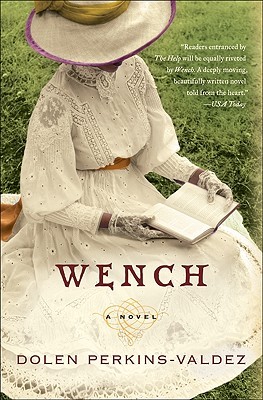
Wench: A Novel
Wench is the debut historical novel from Dolen Perkins-Valdez that gives us a glance at how American slavery impacted women and the intricacies of the relationships between master and slave.
Book Title: Wench: A Novel (P.S.)
Author: Dolen Perkins-Valdez
Genre: Historical fiction, contemporary fiction
Length: 290 pages Hardcover
Publish date: 2010
Publisher: Amistad/Harper Collins
Previous books: N/A
Similar books/authors: Kindred by Octavia Butler, The Kitchen House by Kathleen Grissom
Re-readability: 7 /10
Favorite Quote: “Miss Fran says we’ve got to move out to the quarters,” Lizzie announced. She wanted them to believe their beloved Fran had decided upon this loss of status, not their father. It was better, she figured, for them to know sooner rather than later that the white people they loved would disappoint them.”
Wench is a historical novel that addresses one of the darkest, most denied times in US History: slavery. It’s ironic because it’s set at the end of American slavery with the nation divided and on the brink of civil war, a time that is usually painted with glowing tales of Abraham Lincoln and other brave white men risking loss of territory under the guise of preserving another’s freedom. That is not the story that Perkins-Valdez tells.
Wench is the story of four slave women, Lizzie, Mawu, Sweet and Reenie, who are favored enough by their masters to be taken to Tawawa House, a resort in the free state of Ohio. At first the women view this as a privilege, a display of devotion from their masters, a hint that those rough handlings on the floors of their slave quarters are truly a unique form of intimacy.
However, a starkly different viewpoint is brought in by slave Mawu, a newcomer to Tawawa House who vocally detests the master who brought her there. As Mawu tells her story and the women see firsthand brutalities that draw audiences instead of horror, they begin to recall their own stories of abuse and humiliation. A slow realization passes over them that loving one’s property does not hold the same opportunities as a love that is borne through mutual trust, respect and commitment.
Wench shows how constant demoralization forces these women to detach themselves from the scraps of family they’ve been afforded, the mulatto slave children they’ve been forced to bear and even their own destinies. Tawawa House is a place where, for a brief while, they’re allowed to foster friendships, participate in comradery and in passing moments are even given the privilege of being treated humanely.
As abolitionists gain momentum and freedom continues to beckon, the women weigh risk versus reward. They know that Tawawa House cannot last forever, and since Mawu their view of the slave resort has shifted. They are faced with a decision to abandon the masters they think they love, the children who will inherit their transgressions and hope that the white people they’re promised will lead them along the way will not be swayed by large slave rewards that only increase with time.
In Wench, Perkins-Valdez explores a sliver of history that’s been disregarded out of shame and convenience and in this debut novel introduces us to the worn-down backbone of a young and naive nation whose voices have been forcefully muffled over time.
Dorkproval rating: [Rating:8/10]
Categories: Reviews

